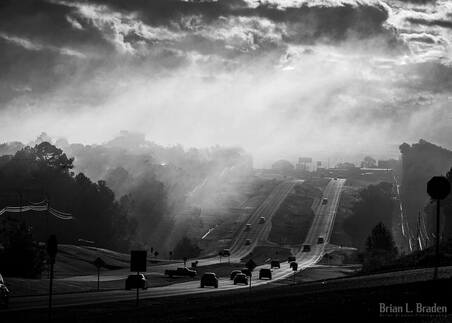 "Wiregrass Rush Hour." 2020 Brian Braden Photography "Wiregrass Rush Hour." 2020 Brian Braden Photography I was going to write a blog this morning either about the function of faith in civilization or how left-lane drivers really irritate me. Guess which topic won? (Sung to the tune of “Life in the Fast Lane” by the Eagles) He was a slow-driving man He was brutally oblivious, and she was terminally texting, She held them up, and he braked for no reason In the heart of the slow, slow traffic. They had one thing in common. They didn’t know how to use a turn signal "Slower, Slower the lights are turnin' red!” Life in the left lane, surely make you lose your mind. Bad lyrics and kidding aside, left-lane drivers drive me nuts. I suspect I’m not alone . There are many more eloquent than I who have commented on those who park in the left lane and don’t move over. I try not to let them annoy me anymore, because nothing is going to change the fact they will always be with us. You see, left-lane driving is proof of the existence of original sin. (stay with me here) When Jesus said “The poor will always be with you” I think he also meant a lot of things people do will always be with us. You see, in most cases we humans are taught what’s right. Logically, we know what is good and bad. Wash your hands before you eat. Don’t mix beer and wine. Watch what you eat. Murder is bad. Never get involved in a land war in Asia. Don’t hang out in the left lane. Yet, we do it all anyway. When one hangs out in the left lane, and people start resorting to passing on the right it’s a clue you’re doing something wrong. But I'm not not really just talking about left-lane driving, its about following rules. When I say "follow rules", I’m not referring to high-minded concepts like civil disobedience and rebelling against tyranny. I’m talking about following speed limits, not littering, flushing the toilet and putting the twisty tie back on the bread bag. I'm referring to responsible civic-mindedness. The simple stuff and the blatantly obvious. Most people see the wisdom in following traffic rules, or most civic rules. However, some people think rules are for other people. This attitude is neither malicious nor uncommon. It’s just being human. What isn’t discussed much about this phenomenon is that people who think this way often think consequences are for other people, too. This is at the heart of what I’m trying to get across. A few years back I took my three young children to the park. A ring of signs clearly stated pets were not allowed in the playground areas, and 99% of the greater park was open to pets including two dedicated dog parks. While my children played, a woman strolled right into the playground area with a Great Dane on a leash, sat on a bench, and stuck her face in her phone. The horse-dog then proceeded to urinate and defecate where the children played. She thought the rules didn’t apply to her, nor did the consequences. The kids stepping the animal waste paid the price, not her. I’m not judging her, because I’ve been her before in regards to other infractions. I think we all have, to some degree or another. We’ve all bent, ignored, or consciously blown-off common sense rules put in place to protect others and ourselves. Sometimes the consequences may be something smelly and squishy between our toes, and sometimes it’s far worse. A few weeks ago I witnessed an accident where a young woman decided to pass on a two-lane blacktop in a no-passing zone. She was approaching a limited-sight hilltop at full highway speeds and decided to pass a the vehicle in front of her. And pass she did, and immediately collided head-on with an automobile pulling out onto the highway. The no passing zone was clearly marked. Common sense says passing when approaching a hilltop is a bad idea. Yet, she did it anyway, and horror resulted. Why do we do it? We want rules. We elect politicians to make laws. We hire bureaucrats to regulate us. We want our police to enforce them. Yet, as individuals we often brush rules aside, sometimes cavalierly, like it’s cool. When we step in dog crap in the playground, or get stuck behind the guy driving five miles an hour under the speed limit in the left lane, we shake our fists and wonder why people can’t follow the rules. Then there are those times when tragedy strikes because someone decided the rules didn’t apply to them. All of us take a bite of Eve’s apple from time to time and end up hanging out in the left lane. It’s in our DNA. It’s a flaw in our programming at the deepest level. This inherent flaw, dare I say sin, of willful disobedience is fundamental human nature. No number of laws, rules or regulations or screaming at the car in front of you will change it. So stop screaming at the guy in the left lane, or you’ll surely end up losing your mind. You're not going to change him. Maybe we need to work harder on changing our own behavior. In life, the only driver you can control is yourself. #traffic #essay #orginalsin #sin #culture #society #issue #faith #religion *** If you enjoyed this blog, please like the post and leave a comment or if you're feeling brave, share it on social media. This platform is my entire advertising budget and is how I share the word on my books. Also visit my Facebook, my author page and check out my photography book from America Through Time, "Abandoned Wiregrass: The Deepest South's Lost and Forgotten Places." |
Archives
July 2023
Categories
All
|
 RSS Feed
RSS Feed